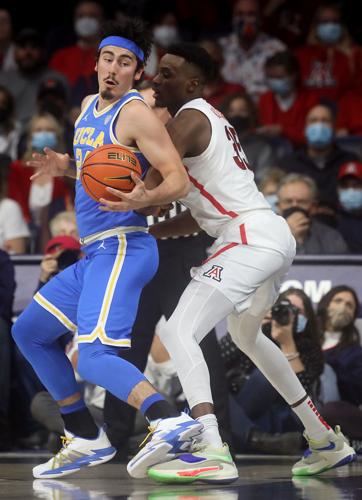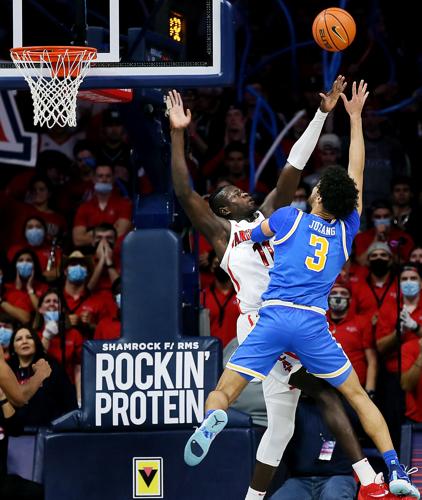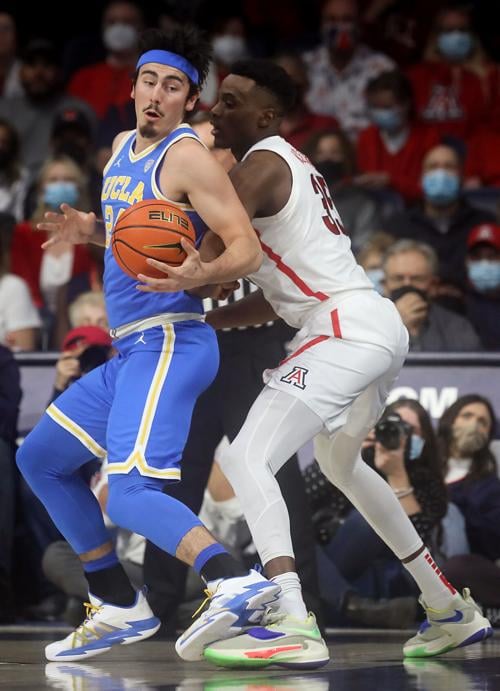With four minutes left Thursday at McKale Center, after Arizona’s 17-point lead over UCLA had shriveled all the way down to three, ESPN analyst Bill Walton asked the same question the 14,000 people around him might have.
“Where’s Mathurin?” he said.
Bennedict Mathurin was on the bench ... where he was sitting right next to Azuolas Tubelis.
That’s right: Arizona’s top two scorers were not on the court. In crunch time, with first place in the Pac-12 on the line and, possibly, maybe even a No. 1 NCAA Tournament seed if the winner kept it going.
What’s more, neither player was in foul trouble and, according to UA coach Tommy Lloyd, Tubelis wasn’t “at all” bothered by his sprained ankle at that point.
It’s just that Lloyd said he liked how the adjustment was playing out, and he wasn’t budging.
The UA coach liked having twin 7-footers Christian Koloko and Oumar Ballo in the game, and he liked the perimeter defense of Pelle Larsson and Dalen Terry, gambling that defense would eventually shut down the Bruins more than any additional offense might overcome them.
It was a prevent defense, of sorts.
“Sometimes you sub, you just get a feel for something and you kind of ride it out,” Lloyd said. “And I think that that lineup defensively is tough. I mean, they were getting to the rim and now you’re running into Oumar, or C-Lo’s coming from the backside. That’s tough. So you can kind of stay sticky in all your coverages.”
It paid off. Over the final 3:41, after UCLA had pulled within 64-61, the Bruins were just 2 of 6 from the field, with center Cody Riley getting blocked by Ballo and missing two other shots inside.
On the other end, Larsson picked up two fouls and hit all four resulting free throws while Koloko went 3 of 4 from the line over that period.
The Wildcats were up by double digits entering the final minute and the game stayed that way. Arizona won 76-66, pretty much the opposite outcome of the Wildcats’ 75-59 loss at UCLA just over a week earlier.
The Wildcats had spent the nine days since thinking about how to handle the Bruins’ offensive mismatches, guys like Johnny Juzang and Jaime Jaquez who are equally comfortable taking smaller guys inside or shooting over bigger ones outside.
“We knew what they were gonna try to do, trying to play one-on-one iso, and we adjusted,” Ballo said. “We changed our defensive lineup a little bit and we play harder.”
That may have sounded easier in theory than in practice. Especially because playing the 7-footers together meant Koloko would be dispatched more often to the perimeter to help out.
But that’s something, again, that Lloyd has become more comfortable with.
“I don’t know if I can say enough about C-Lo as a defender,” Lloyd said, referring to Koloko. “I mean, to put a 7-1 guy on the perimeter, switching screens, guarding isos, getting through ball screens, is pretty rare and pretty unique. So he gets a ton of credit.
“And Oumar gets a ton of credit for developing into the player he has always had potential to be. So now there’s value in playing both of them together.”

Arizona center Oumar Ballo defends Johnny Juzang, drawing contact, in the second half. Tommy Lloyd praised the development of Ballo, who started his college career at Gonzaga.
Offensively, Lloyd also did some tinkering over those nine days after UA shot a season-low 32.2% from the field in UCLA’s win at Pauley.
First, he decided to go to Tubelis, who had now had two full weeks to improve on his still-sore sprained ankle suffered on Jan. 20 at Stanford. The Wildcats found the Lithuanian forward early and often, with Tubelis scoring eight points over the first six minutes.
That set a foundation before the Wildcats went on a 12-0 run that put them comfortably ahead for much of the game.
“I think we made a lot of adjustments from the way we played the last game,” Lloyd said. “We kind of had to change some of our offensive schemes a little bit. I wanted to go inside even more than we did. I think that really kind of got us started today. There’s a real advantage for us in there.
“And defensively, we didn’t sit back. We were way more aggressive. Obviously it’s probably tougher shooting on the road than it is at home but we didn’t want to sit back and let them dictate the terms like they did at UCLA.”
The thing is, Arizona didn’t dictate a 90-point game, like it has so many times this season.
Lloyd just downshifted a bit.
“I thought we didn’t need to play frantic, so I told our guys, ‘Hey, let’s value possession because they’re a good defensive team,’” Lloyd said. “We ran maybe more sets than we’ve run all year.
“You have to be able to win games multiple ways. I don’t care if we’re running. It’s not an aesthetic for me. It’s about a result. I love playing fast because I think it makes the game easier. But if you’re not if playing fast, if Mach speed is not the right plan to win the game, well then, we’ll slow it down.”
Another sort of plan might be deemed necessary Saturday, when USC arrives at McKale Center with inside-outside threat Isaiah Mobley, grizzled post player Chavez Goodwin and dynamic combo guard Boogie Ellie.
Lloyd said he was already working on preparations for USC on Thursday morning, before the UCLA game even.
But Lloyd said that didn’t mean he wasn’t still focused on the Bruins. It’s just that he had already made up his mind about UCLA and instead was budgeting some time for a USC team he says is “right at that level” with the Bruins.
For Lloyd, there was no need to obsess.
“After a while, you look at something so much you can talk yourself out of doing the right thing,” Lloyd said. “So once you kind of settle in on your plan, you trust it, believe in it, and then you got to start working on the next plan.”






